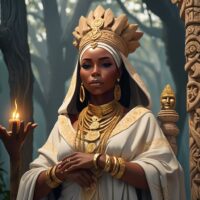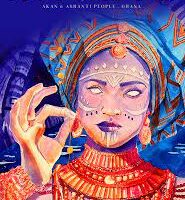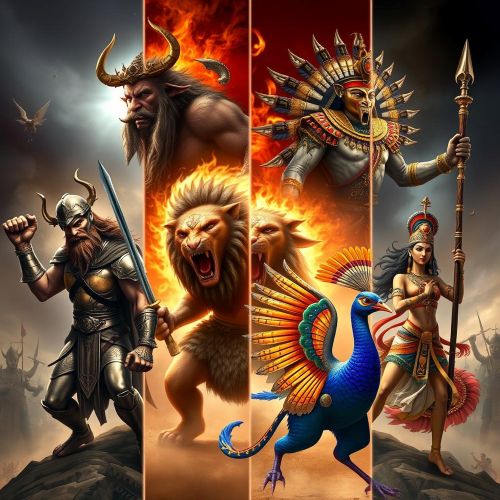Amokye : Guardian of the Dead
Listen
At a glance
| Description | |
|---|---|
| Origin | Ashanti Mythology |
| Classification | Spirits |
| Family Members | N/A |
| Region | Ghana |
| Associated With | Souls, Land of Dead |
Amokye
Introduction
Amokye is a central figure in the religious traditions of the Akan and Ashanti people of Ghana. She serves as the guardian at the entrance to ‘Asamando,’ the Land of the Dead. As a psychopomp, her primary role is to welcome the souls of deceased women into the otherworld.
Amokye is not considered a deity but is a powerful spirit with a crucial role in the afterlife, acting as the gatekeeper between the living and the spirit realm. Her presence in Ashanti mythology is deeply significant, symbolizing the passage of souls and their transition to the afterlife. This revered figure embodies tales of guidance, spiritual transition, and the eternal journey of the soul, making her an integral part of the Ashanti spiritual narrative.
Physical Traits
The physical traits of Amokye are not explicitly detailed in traditional Ashanti stories. However, she is commonly envisioned as a woman, reflecting her role in guiding the souls of deceased women to the afterlife. Some accounts describe her as having an imposing and regal presence, possibly adorned in traditional Ashanti funeral attire like the “amoasie” loincloth and elaborate jewelry, symbolizing her connection to the deceased.
Despite these occasional descriptions, Amokye’s physical form remains largely ambiguous and shrouded in mystery. This allows individuals to imagine her in ways that resonate with their personal beliefs and experiences. Sometimes, she is depicted as an elderly woman residing by the river that leads to the afterlife, symbolizing the transition between the physical and spiritual realms. This flexibility in her portrayal highlights her powerful and enigmatic nature in Ashanti mythology.
Family
In traditional Ashanti stories, little is mentioned about the family of Amokye, with narratives predominantly focusing on her pivotal role as the guardian of the otherworld’s entrance. There are no references to Amokye’s family lineage within Ashanti mythology, portraying her as a solitary figure solely dedicated to her duty as the guardian of Asamando. This emphasizes her impartiality as a guide for the deceased, free from earthly attachments or biases.
Despite the absence of explicit familial ties, the concept of family in Ashanti mythology extends beyond biological relations to encompass spiritual and communal bonds. Amokye’s significance lies in her connection to the ancestors and the spirits of the deceased, embodying the role of guardian and guide to ensure the safe passage of souls to the afterlife. In this way, she upholds the spiritual continuity of the Ashanti people, underscoring the importance of ancestral reverence and the interconnectedness of the spiritual realm.
Other names
Amokye’s name holds significance, particularly in the Kyerepon dialect spoken in parts of Ghana, where “Anokye” translates to “Ano look.” This name may allude to a defining event surrounding her birth, suggesting a unique purpose or emphasizing her vigilant role as a guardian. Variations such as “Amonekye” or “Amongkua” exist, likely stemming from the same linguistic root, but “Amokye” remains the most widely used and recognized name in Ashanti mythology.
There are no known alternate names for Amokye in traditional stories, highlighting the consistency of her identity and role in guiding souls. Unlike some deities with multiple epithets, Amokye’s singular name underscores her importance as a figure of guidance within the Ashanti belief system.
Powers and Abilities
Amokye possesses the power to grant passage into Asamando, the Land of the Dead, within Ashanti mythology. Deceased women approach her, often presenting gifts of jewelry or cloth as symbolic payment for her services. Amokye evaluates their worthiness and determines their fate within the spirit realm based on criteria believed to be connected to their conduct in life. Furthermore, she is said to possess a supernatural awareness, capable of discerning the true nature of a soul and its readiness for the afterlife.
Amokye’s pivotal role as the guardian of Asamando underscores her significance in the Ashanti religious landscape. Acting as the first point of contact for deceased women transitioning from the world of the living, she holds the ability to welcome their souls to the otherworld. Her powers and abilities are rooted in her role as a guide and protector of souls, enabling her to navigate the realms between the living and the dead. With profound knowledge of the spiritual world, Amokye ensures the proper reception and integration of the deceased into the ancestral realm, embodying the essence of spiritual harmony and continuity.
Modern Day Influence
Amokye’s impact in modern times reverberates through the cultural and religious customs of the Ashanti people, rooted in her revered role as the guardian of the otherworld. These beliefs shape Ashanti perspectives on death and the afterlife, evident in their funeral traditions and ceremonies. Symbolic acknowledgments of Amokye’s guardianship often feature in funeral rites, particularly those honoring women, through rituals, offerings, and representations like sculptures or masks.
Beyond traditional rituals, Amokye symbolizes female strength and leadership, embodying unwavering dedication to her duty and a keen discernment of truth. She stands as a beacon, inspiring individuals to uphold integrity and honor in their lives. Amokye’s presence highlights the vital role of women in society, particularly within the spiritual realm, offering solace to those mourning the loss of loved ones by affirming the belief in a transcendent existence beyond death.
While deeply rooted in ancient mythology, Amokye’s legacy endures in contemporary Ashanti culture, emphasizing the significance of honoring the deceased and embracing the interconnectedness of the spiritual and physical worlds. Through funeral rites, ancestral veneration, and cultural expressions, the enduring influence of Amokye underscores the cyclical nature of life and death, guiding the Ashanti people in navigating the mysteries of existence.
Related Images
Frequently Asked Questions
What is lorem Ipsum?
I am text block. Click edit button to change this text. Lorem ipsum dolor sit amet, consectetur adipiscing elit. Ut elit tellus, luctus nec ullamcorper mattis, pulvinar dapibus leo.
What is lorem Ipsum?
I am text block. Click edit button to change this text. Lorem ipsum dolor sit amet, consectetur adipiscing elit. Ut elit tellus, luctus nec ullamcorper mattis, pulvinar dapibus leo.
What is lorem Ipsum?
I am text block. Click edit button to change this text. Lorem ipsum dolor sit amet, consectetur adipiscing elit. Ut elit tellus, luctus nec ullamcorper mattis, pulvinar dapibus leo.
What is lorem Ipsum?
I am text block. Click edit button to change this text. Lorem ipsum dolor sit amet, consectetur adipiscing elit. Ut elit tellus, luctus nec ullamcorper mattis, pulvinar dapibus leo.
What is lorem Ipsum?
I am text block. Click edit button to change this text. Lorem ipsum dolor sit amet, consectetur adipiscing elit. Ut elit tellus, luctus nec ullamcorper mattis, pulvinar dapibus leo.





